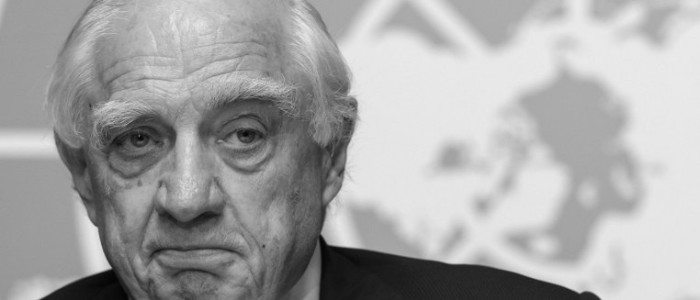Published
IN MEMORIAM – PETER SUTHERLAND
By: Roderick Abbott
Subjects: WTO and Globalisation

Peter died last Sunday in a hospital in Dublin, his home city and home country. He was aged 71. He had suffered a heart attack in September 2016, which proved ultimately to be fatal, and had been in hospitals ever since.
I last saw him in London just a week before this happened and we talked about the subject of the moment – the implications for British trade after the UK left the EU. But I had in fact known him over many years – since his time in Brussels in the 1980s and later in Geneva 1993-95. I had an enormous respect for his human qualities, his liberal approach to policy issues and his ability to tackle big challenges with success; and my connection to him along his career are described in a recent message sent to his wife and family:
“I think we have never met, and Peter probably did not mention the names of junior collaborators during his career – there was no reason. I am a former trade official in the European Commission, who was first called on to explain to him about trade negotiations in his Brussels days, and then again to join in the effort to complete the major trade deal that he supervised in 1993 in his Geneva days. Some years later I was the EU Ambassador in Geneva, and later again became a deputy DG at the WTO – following in the footsteps.
Since retiring in 2005 I have worked with a Trade Policy think tank in Brussels [ECIPE] and we met each other again when he was in town to lend support for a major project that was being launched in 2015, and that led directly to a series of exchanges between us and with Nick Clegg about the substantial negative impact of leaving the EU on UK trade – exports and inward investment, often aiming at the EU market. Throughout it has been my real pleasure to assist and contribute ideas to the common cause of explaining to the public the economic consequences of the decision they made …. “
This is not intended to be a conventional obituary, which others will certainly do much better than I can. My idea is to write about the man I knew, and about his connection in the international trade field to a junior collaborator who shared many of his enthusiasms and liberal trade ideas.
Peter Sutherland began his career as a practising lawyer before becoming a political figure, and later a prominent leader in the financial and business worlds; but to me he was above all a man with a profound belief in the post-war liberal trading system, embodied in the GATT, and with a sharp understanding of the issues that arise in international trade. This spanned both the politics, in developed and developing countries, and the varied interests of governments at the multilateral level; but also the more technical and detailed issues that underpinned the workings of international trading rules, issues that determine how trade in goods and services flows across national borders but also inevitably create barriers which obstruct the flow.
In the personal message that I cited above I referred to Peter’s “Brussels days” – in the mid-1980s, when he was an EEC Commissioner – and later his “Geneva days” – from 1993-1995, when he was first the Director General of GATT, towards the end of the Uruguay Round, and then in transition to becoming the first chief of the WTO. Trade was not part of his portfolio in Brussels, but he already showed a keen interest in the tariff liberalisation work and in the new rules on non-tariff barriers (such as dumping, standards, subsidies etc) that were being negotiated at the GATT; and this was put to good use later when he was appointed to bring the Uruguay Round to a conclusion.
This negotiation had been dragging on since 1986 and was facing an impasse in negotiation between the EU and the USA on agricultural trade, and subsidy issues in particular. Much of the content of the specific agreements that emerged from the Round was already in place, and Peter’s role was the more political one of driving all members forward to a political agreement on the basis of a consensus. As a former EU figure, he was very much the candidate of the EU but was also acceptable to other major players such as the USA, Japan and Canada – as well as countries such as India and Brazil. Peter’s achievement was to tackle this at the highest political levels over six months or so, and to push and shove as required until all participants were ready to fall in line and allow him to ‘gavel’ the final agreement through. Of course this was not all, much tying up of loose ends was needed throughout 1994 and beyond until the conference in Marrakesh.
My more recent association with Peter has been since 2015 when he came to an event in ECIPE to launch the Five Freedoms project. This was highly appropriate since he has been called “a lifelong champion of individual and economic freedoms”- as reflected in his support for trade liberalisation and later his work on international migration. For me, this meeting led to many exchanges throughout 2016 about the trade and economic consequences of the UK decision to leave the European Union, a subject on which we were both convinced that there was no way that the UK, on an economic analysis, could ever be better off outside rather than in membership. This view has been endorsed and repeated by Michel Barnier since, and has only been amplified by the later decisions to leave the Single Market and the Customs Union.
For Peter that was a project not yet completed; for myself it is a torch that I am happy to pick up and carry forward.